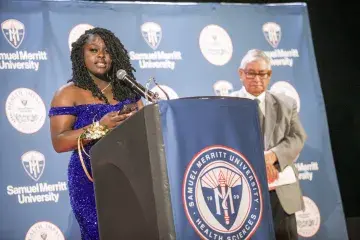Highly Addictive: Award-Winning Researcher Works to Unwind America’s Opioid Epidemic

About three years ago, Sarah Jingying Zhang, PhD, CRNA ’15, began looking for solutions to America’s opioid epidemic. Her ongoing—and now award-winning research—focuses on alternatives to common opioids used for chronic pain management, opioids that can be highly addictive and not effective for treating pain.
In U.S., opioids are misused by an estimated 9.9 million people a year, fueling an ongoing epidemic that killed nearly 15,000 in 2018 alone, according to the latest data available from the U.S. Department of Health and Human Services and Centers for Disease Control and Prevention.
Zhang’s research explores the psychological factors of chronic pain and tests the efficacy of two pharmaceuticals in treating chronic pain: a popular antidepressant and a rarely prescribed opioid. Her research focuses on patients who have undergone high-risk surgery—spinal surgery, a total knee replacement, or a mastectomy—because they are leading causes of chronic pain.
“Pain is salient yet highly subjective,” says Zhang, a graduate of SMU's Master of Science in Nursing – Nurse Anesthesia program. “A painful procedure may be perceived as such by some people, whereas others may perceive it as not painful. Hence, pain is more about pain perception. Psychological factors play a significant role in pain management, and we haven’t really explored this as a therapy until now.”
When used to manage chronic pain, common opioids often cause patients to become depressed and are not actually very effective at reducing chronic pain, Zhang says. “If you’re depressed or anxious, everything is worse, including your pain. My research is finding that if patients take antidepressants, they’re less depressed and release more endorphins, which is a natural healing process.”
Researcher of the year
The antidepressant Effexor XR is commonly prescribed to treat depression, but Zhang’s research on it for chronic pain management is new. The opioid buprenorphine is infrequently prescribed because animal research from the 1970s incorrectly classified the drug, but Zhang thinks it has great potential for chronic pain. It offers antidepressant and pain-relieving effects, and its chemical makeup does not cause depression the way other opioids do, she explains.
The significance of Zhang’s work is gaining national attention. She recently received the prestigious 2020 John F. Garde Researcher of the Year Award from the American Association of Nurse Anesthetists, and has two papers coming out in that organization’s journal.
In addition to her research, Zhang maintains a clinical practice at UCSF and teaches Acute and Chronic Pain Management as an adjunct assistant professor at Samuel Merritt University.
“Teaching at Samuel Merritt University is what really inspired my research,” Zhang says. “It’s when I started to think deeply about what is pain, how to treat it, and how to prevent and minimize chronic pain.”


